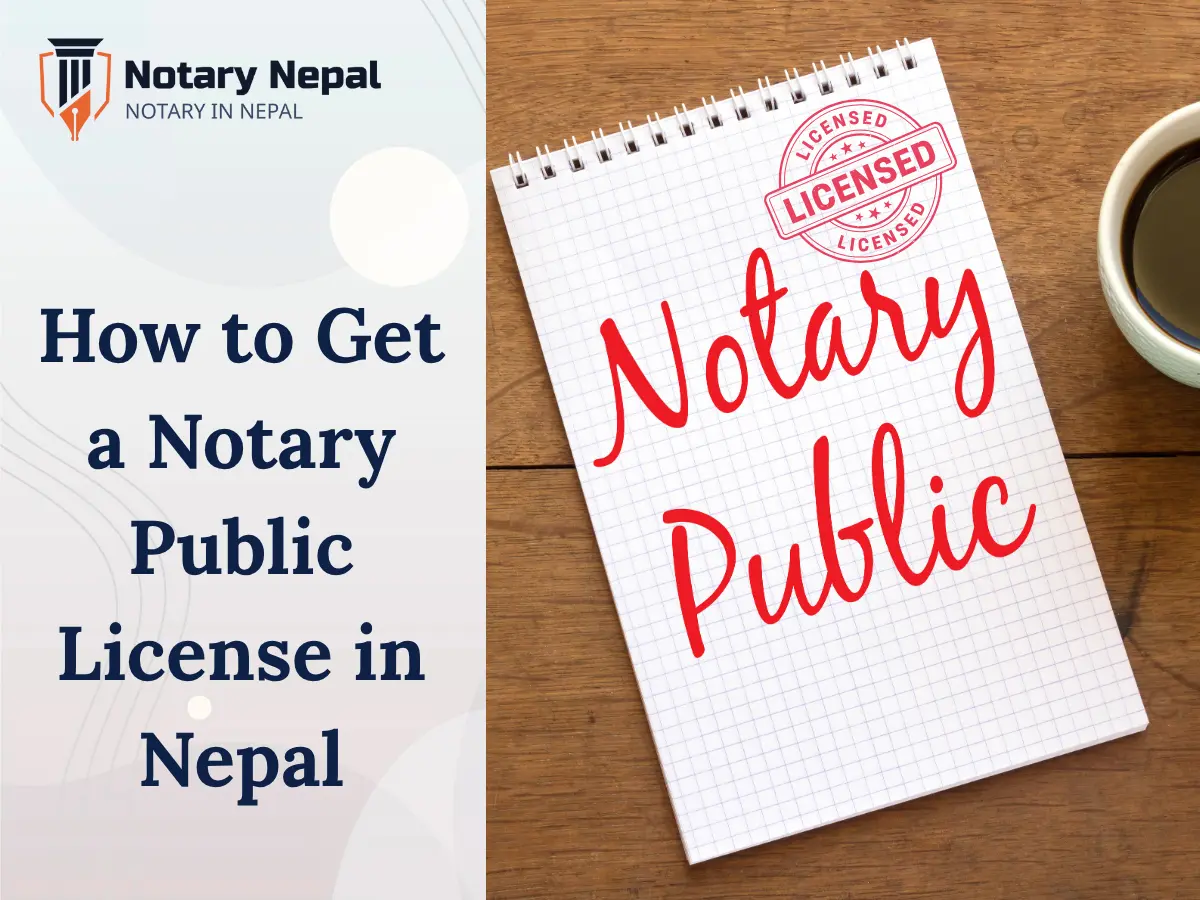

Table of Contents
As Nepal’s legal, financial, and commercial sectors grow, the demand for certified and ethical notary professionals has never been higher. Whether you're a law graduate, legal professional, or someone interested in serving as an authorized verifier of legal documents, understanding the notary public licensing process in Nepal is crucial.
In this guide, you'll find everything from eligibility criteria and application steps to examination details, renewal rules, and career prospects for notary license holders in Nepal.
Why a Notary Public License Matters in Nepal
A notary public in Nepal plays a vital role in ensuring the authenticity and legality of documents such as affidavits, agreements, translations, property deeds, and power of attorney. Licensed notaries help prevent fraud, verify identities, and ensure procedural compliance with legal requirements.
Becoming a licensed notary not only enhances your professional credibility but also opens doors to court work, government projects, private practice, and legal consultancy roles.
Section 1: Eligibility Criteria for Notary Public License
To apply for a Notary Public License in Nepal, you must meet the following conditions as per the Notary Public Rules, 2063:
Basic Qualifications:
Must be a Nepali citizen
Minimum age of 25 years
Holds a Bachelor’s Degree in Law from a recognized institution
Must have at least two years of legal experience
Disqualifications:
Conviction in a criminal offense involving moral turpitude
Membership in political parties during the application
Mental or physical incapacity as per medical certification
Note: There are also separate eligibility criteria for translators applying for a notary license under the translator category.
Section 2: Application Process for Notary License
Step-by-Step Instructions:
Visit the Notary Public Council’s official website
Download the latest application form (Notary Form 1)
Attach required documents:
Citizenship certificate (copy)
Law degree certificate and transcript
Evidence of work experience (2 years minimum)
Recent passport-sized photos
Pay the application fee via bank voucher
Submit the form physically or online during the announced window
Application Window for 2082:
Usually opens once a year, often between Ashar and Shrawan (June–August).
Section 3: Notary License Exam – Syllabus, Dates & Results
After application, qualified candidates must appear for a written examination.
Exam Structure:
Multiple-choice questions (MCQ) and short answer questions
Topics: Notary Public Rules 2063, translation ethics, Nepali legal system, document categories, and notarization procedures
Key Information:
Passing Marks: Minimum 50%
Exam Centers: Major cities like Kathmandu, Pokhara, and Biratnagar
Result Publication: Available on the Notary Council portal within 45 days
Tip: Visit the Council website to download the syllabus and past questions for effective preparation.
Section 4: License Issuance and Responsibilities
After passing the exam, selected candidates receive a Certificate of Notary Public from the Council.
Duties of a Notary Public:
Verify and certify signatures
Authenticate affidavits, translations, and declarations
Assist with drafting legal statements
Maintain records of every notarized act
Issue certified copies of original documents
All notaries are bound by the Code of Conduct issued by the Nepal Notary Public Council.
Section 5: License Renewal Process in Nepal
Your Notary Public License is typically valid for 3 years, after which it must be renewed.
Renewal Requirements:
Application before expiry
Renewal form and old certificate
Proof of professional conduct (no disciplinary issues)
Renewal fee payment receipt
Renewal Tips:
Late submissions may incur fines or lead to license suspension
Always check the Council's renewal notice section for dates
Section 6: Role of Nepal Notary Public Council
The Nepal Notary Public Council is the central regulatory authority responsible for:
Issuing and renewing notary licenses
Conducting notary exams
Handling grievances and misconduct complaints
Publishing notices and exam results
Updating rules and conducting workshops
Website: https://notarycouncil.gov.np
Section 7: Career Scope After Becoming a Notary
Career Opportunities:
Freelance legal translator and notary
Legal consultant for law firms
Document specialist for immigration agencies
Court document verification agent
Authorized notary for embassies
In-house notary for real estate or finance firms
Salary & Perks:
Average monthly earnings range from NPR 30,000 to NPR 150,000+ depending on volume
Freelancers can set their own service rates
Bonus: Translators can also apply for a specialized translator-notary license through a separate exam.
Section 8: Tips & Frequently Asked Questions (FAQs)
Tips:
Prepare for the exam with authentic Nepali legal resources
Attend free webinars or paid training from law colleges
Maintain ethics—misconduct leads to disqualification or revocation
Keep your license updated to avoid removal from the register
FAQs:
Q: Can a government employee become a notary?
A: Only if permitted under departmental rules; most full-time civil servants are ineligible.
Q: What happens if I fail the exam?
A: You can reapply next year. Some years allow re-examination within 6 months.
Q: Is there an online application system?
A: Yes. Most forms and notices are available on the Council’s portal.
Conclusion: Begin Your Notary Journey in Nepal
Getting a notary license in Nepal is an achievable goal with structured preparation. Whether you want to enhance your legal career, offer professional services, or support documentation in legal proceedings, becoming a notary is a fulfilling and respected role.
If you're eligible and passionate, this year could be your chance to qualify, certify, and serve.
For notices, updates, and application forms, visit: https://notarycouncil.gov.np
For assistance with legal translations or notarized services, contact: Notary Nepal or call +977-9765979296
Notary Nepal — Your Trusted Partner for Legal Certification and Translation in Nepal
This article is for informational purposes only and does not constitute legal advice, advertisement, or solicitation. Notary Nepal and its team are not liable for any consequences arising from reliance on this information. For legal advice, please contact us directly.


